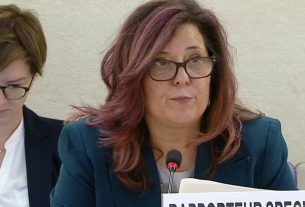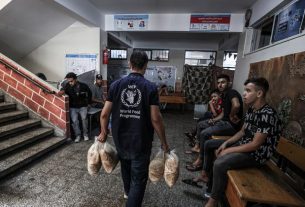Introduction
A volcanic eruption near El Tres, a small town in the Turbo municipality of Antioquia, Colombia, has caused significant damage to local communities and raised serious health concerns. The eruption, which occurred approximately 4.5 kilometers (2.8 miles) northwest of El Tres, has affected at least 109 families living in the area and along nearby roads, leading to property damage and health emergencies.
In the aftermath of the eruption, local authorities have swiftly responded to the crisis, coordinating evacuations and ensuring that the affected individuals receive medical treatment. As the situation unfolds, both governmental and non-governmental agencies are working together to mitigate the immediate risks and prevent further harm.
Impact on Local Communities
The eruption has had a direct and devastating impact on several local communities, particularly in the rural areas surrounding El Tres. According to El Tres Mayor Alejandro Abuchar, 109 families in the vicinity of the volcano have reported damage to their homes due to the eruption, with property destruction and smoke inhalation being the most common concerns.
The eruption’s impact extends beyond just property damage, as the resulting ash clouds and smoke have created hazardous air quality conditions, particularly affecting children and vulnerable individuals.
- Health Emergencies: Immediately following the eruption, three children were reported to have suffered from smoke inhalation, briefly losing consciousness. These children have since been taken to the San Pedro de Urabá hospital, where they are receiving medical treatment. Additionally, five other individuals were reported to have fainted due to the exposure to smoke and ash, further underlining the severity of the event’s health risks. Thankfully, there have been no reports of severe injuries at this time.
The local Coordinator of Risk Management has been working closely with emergency response teams to ensure that all affected individuals are transported to nearby health facilities for evaluation and care.
Evacuation and Temporary Shelter
In response to the growing risks posed by the volcanic eruption, local authorities have initiated evacuations from the most affected areas. A total of 16 families, including 30 children, have been relocated to safer areas, including local schools in Manta Gorda and Santiago de Urabá. These shelters are being used as temporary accommodations, providing affected families with a safe haven while emergency teams assess the situation and plan for longer-term solutions.
Additionally, in Los Mangos, authorities have relocated 35 children to a local school, where they will remain temporarily until the eruption’s immediate threats subside.
The evacuation process is being managed by the local government, supported by teams from Colombian Civil Defense, the National Unit for Disaster Risk Management (UNGRD), and other local agencies that are working tirelessly to coordinate relief efforts and ensure the safety of all residents.
Government Response and Ongoing Efforts
In the aftermath of the eruption, several Colombian government agencies have mobilized to provide immediate assistance to the affected communities. The National Unit for Disaster Risk Management (UNGRD), which oversees emergency response efforts, has been working in close coordination with local governments to assess the extent of the damage and provide resources where needed.
- Evacuation Plans: The government has deployed teams to help evacuate vulnerable populations from the most dangerous areas. Special emphasis has been placed on the safety of children and the elderly, who are at higher risk from exposure to volcanic ash and smoke.
- Health Assistance: Medical teams have been dispatched to local hospitals and evacuation centers to treat those affected by the eruption. The San Pedro de Urabá hospital has been working to stabilize the children who were exposed to smoke, and additional medical support has been provided to those who fainted or showed signs of distress.
- Environmental Monitoring: Experts from Colombian Geological Institute (INGEOMINAS) and other scientific organizations are closely monitoring the volcano to assess the risk of further eruptions and provide updated warnings to local communities.
As part of the longer-term response, authorities are working on rebuilding efforts, especially in communities that have seen extensive property damage. However, this will depend on the evolving situation and ongoing safety assessments.
Volcanic Eruption Risk in Colombia
The volcano near El Tres is part of the active volcanic zone in Colombia, which has a history of eruptions that can affect both local populations and the broader environment. Colombia has several active volcanoes, and the country’s Geological Institute routinely monitors these sites to provide early warning systems for local residents.
Colombia’s risk management systems have been put to the test in this event, and the quick response from local officials and national authorities highlights the preparedness of the country’s disaster management infrastructure.
- Local and National Preparedness: Although the country faces recurring natural disasters, including volcanic eruptions and earthquakes, the government has developed extensive systems to handle emergencies. This includes early warning systems to evacuate citizens quickly, as well as comprehensive health and relief strategies for disaster-stricken areas.
- Geological Monitoring: The Geological Institute continues to monitor the volcanic activity closely, providing regular updates on the situation. The level of volcanic activity remains a concern, and authorities are ready to take further action should the situation escalate.
Conclusion
The volcanic eruption near El Tres in Turbo, Antioquia, has caused significant disruption, displacing families and causing health concerns, particularly for vulnerable children. The swift response from local authorities, including evacuations and medical treatment, has helped prevent further harm to residents. As the situation continues to unfold, government agencies are focused on ensuring the safety of affected communities, providing medical assistance, and monitoring the volcano for any additional activity.
While the immediate risks appear to have been addressed, the ongoing efforts of local and national disaster management agencies will be crucial in managing the aftermath of this eruption and supporting the affected communities in their recovery.
References
- Colombian Geological Institute (INGEOMINAS): Monitoring Active Volcanoes in Colombia
- National Unit for Disaster Risk Management (UNGRD): Colombian Government Response to Natural Disasters
- San Pedro de Urabá Hospital: Local Medical Response in Turbo, Antioquia
- Colombian Civil Defense: Emergency Response Operations



